Breastfeeding: Professional Accountability, Health Promotion, and Care
VerifiedAdded on 2022/12/23
|16
|6260
|90
Report
AI Summary
This report delves into the multifaceted role of healthcare professionals in promoting and supporting breastfeeding. It examines key aspects such as professional accountability, emphasizing the importance of adhering to the NMC Code of Professional Conduct and providing evidence-based care, while respecting a mother's choice regarding infant feeding, including formula feeding. The report also highlights the significance of promoting health and preventing ill health by addressing barriers to breastfeeding and providing accurate information about its benefits. Furthermore, it explores the processes of accessing, retrieving, evaluating, and applying relevant information to ensure informed decision-making. The report underscores the need for assessing patient needs, planning appropriate care, providing effective interventions, and continuously evaluating the outcomes to ensure optimal care for both mother and infant. The report emphasizes the importance of nurses providing support to mothers and offering advice on formula feeding. It also covers the psychological impact of breastfeeding on mothers, including effects on mood, stress, and emotional responses. Finally, it includes the importance of public health promotion and the need for healthcare professionals to provide information on breastfeeding and artificial feeding, ensuring that mothers are given the support they need to make informed decisions.
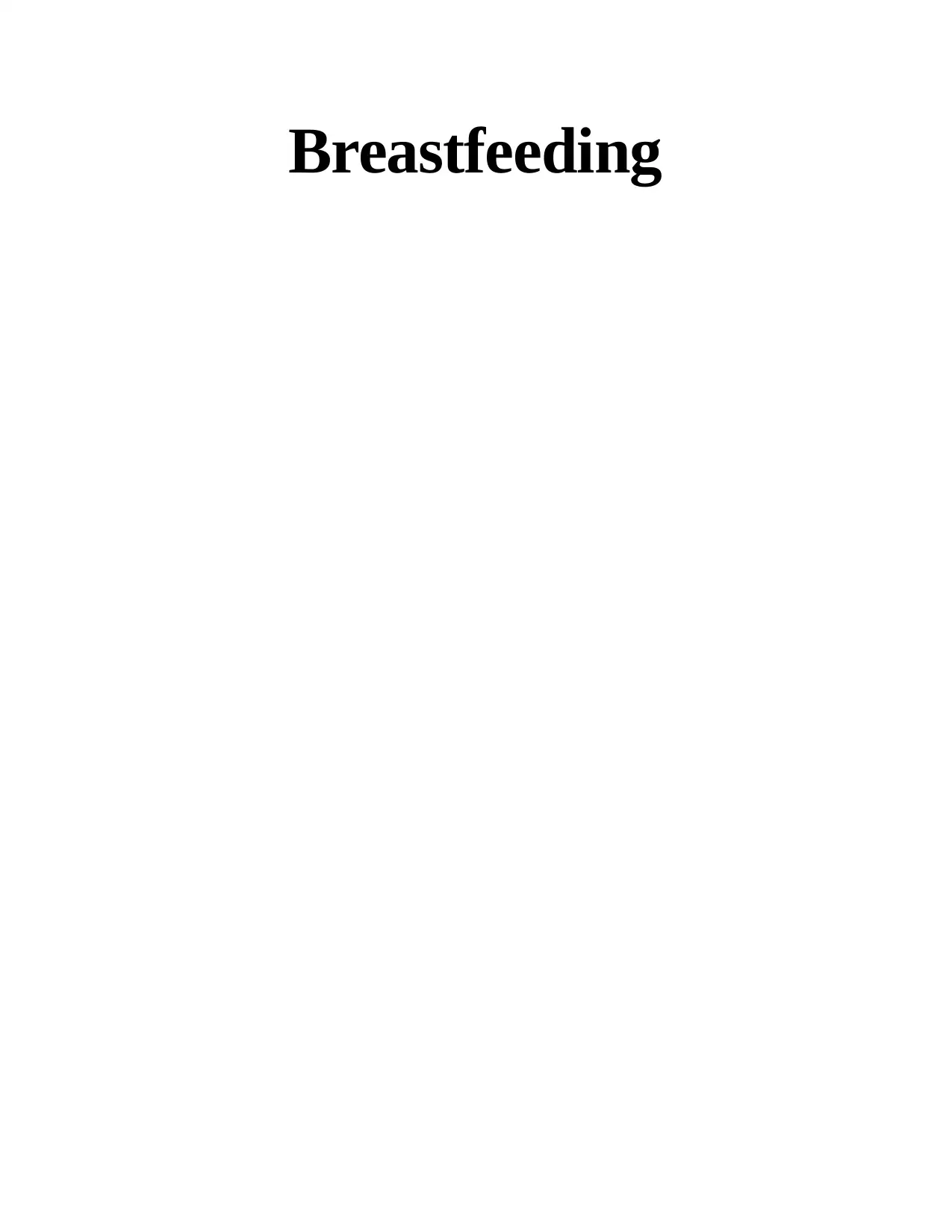
Breastfeeding
Paraphrase This Document
Need a fresh take? Get an instant paraphrase of this document with our AI Paraphraser
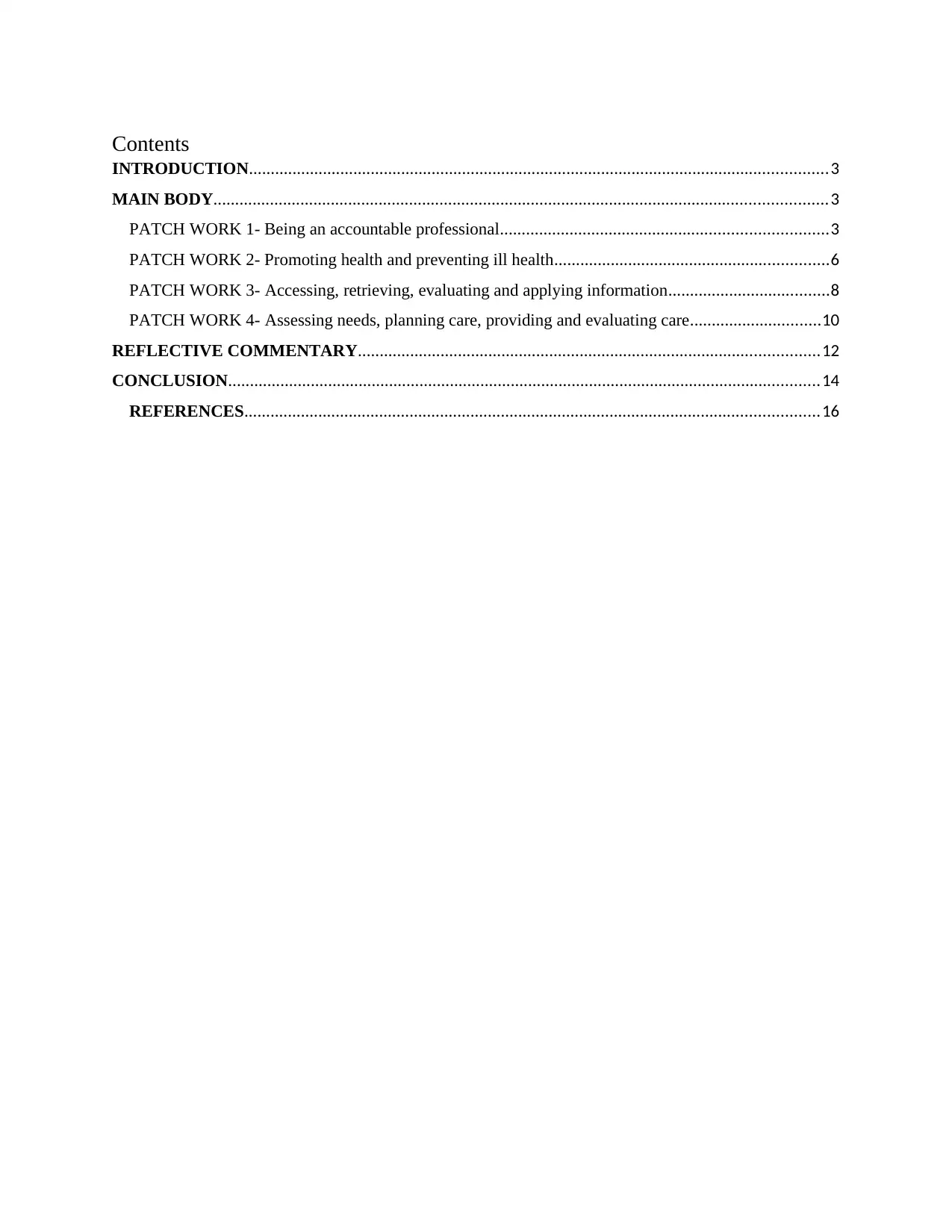
Contents
INTRODUCTION.....................................................................................................................................3
MAIN BODY.............................................................................................................................................3
PATCH WORK 1- Being an accountable professional...........................................................................3
PATCH WORK 2- Promoting health and preventing ill health...............................................................6
PATCH WORK 3- Accessing, retrieving, evaluating and applying information.....................................8
PATCH WORK 4- Assessing needs, planning care, providing and evaluating care..............................10
REFLECTIVE COMMENTARY..........................................................................................................12
CONCLUSION........................................................................................................................................14
REFERENCES....................................................................................................................................16
INTRODUCTION.....................................................................................................................................3
MAIN BODY.............................................................................................................................................3
PATCH WORK 1- Being an accountable professional...........................................................................3
PATCH WORK 2- Promoting health and preventing ill health...............................................................6
PATCH WORK 3- Accessing, retrieving, evaluating and applying information.....................................8
PATCH WORK 4- Assessing needs, planning care, providing and evaluating care..............................10
REFLECTIVE COMMENTARY..........................................................................................................12
CONCLUSION........................................................................................................................................14
REFERENCES....................................................................................................................................16
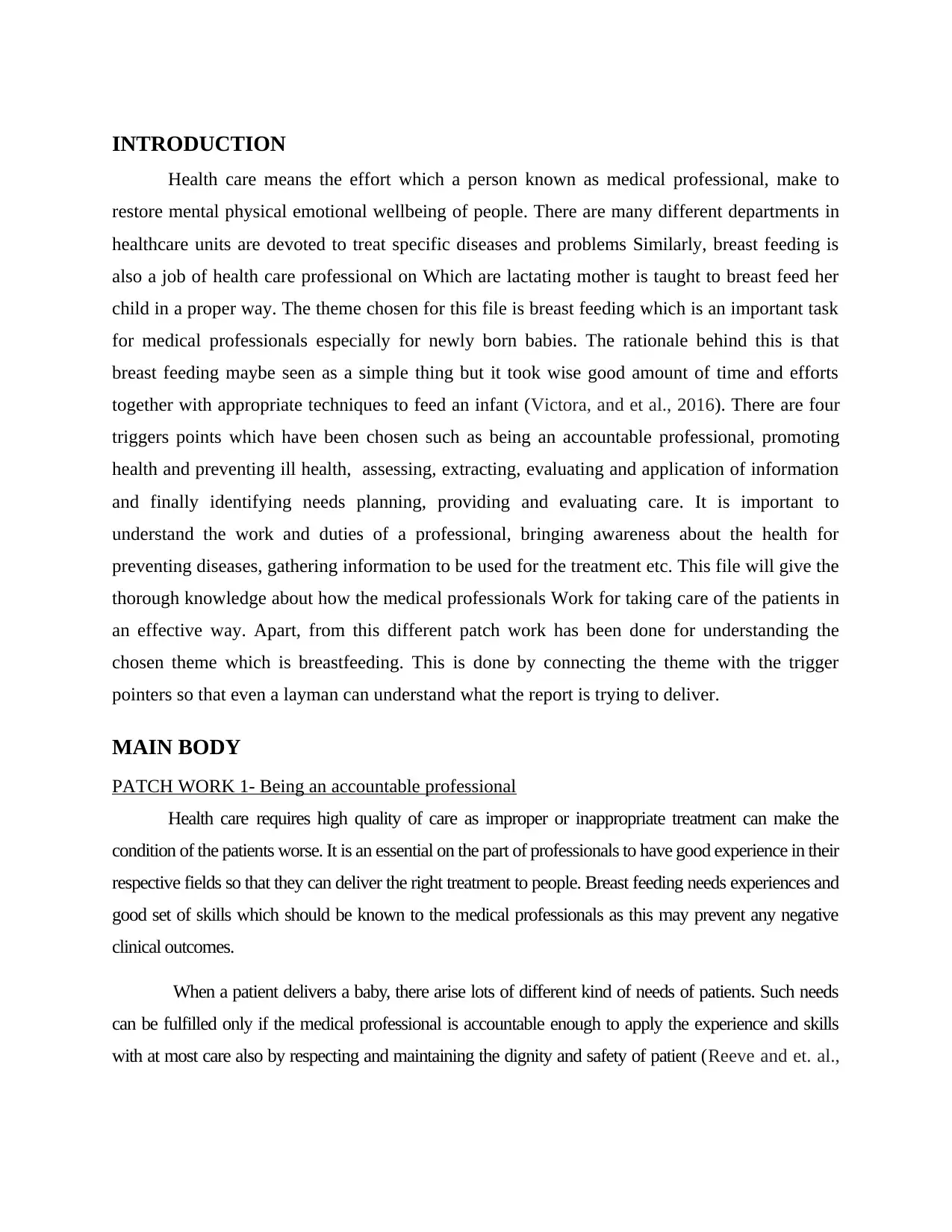
INTRODUCTION
Health care means the effort which a person known as medical professional, make to
restore mental physical emotional wellbeing of people. There are many different departments in
healthcare units are devoted to treat specific diseases and problems Similarly, breast feeding is
also a job of health care professional on Which are lactating mother is taught to breast feed her
child in a proper way. The theme chosen for this file is breast feeding which is an important task
for medical professionals especially for newly born babies. The rationale behind this is that
breast feeding maybe seen as a simple thing but it took wise good amount of time and efforts
together with appropriate techniques to feed an infant (Victora, and et al., 2016). There are four
triggers points which have been chosen such as being an accountable professional, promoting
health and preventing ill health, assessing, extracting, evaluating and application of information
and finally identifying needs planning, providing and evaluating care. It is important to
understand the work and duties of a professional, bringing awareness about the health for
preventing diseases, gathering information to be used for the treatment etc. This file will give the
thorough knowledge about how the medical professionals Work for taking care of the patients in
an effective way. Apart, from this different patch work has been done for understanding the
chosen theme which is breastfeeding. This is done by connecting the theme with the trigger
pointers so that even a layman can understand what the report is trying to deliver.
MAIN BODY
PATCH WORK 1- Being an accountable professional
Health care requires high quality of care as improper or inappropriate treatment can make the
condition of the patients worse. It is an essential on the part of professionals to have good experience in their
respective fields so that they can deliver the right treatment to people. Breast feeding needs experiences and
good set of skills which should be known to the medical professionals as this may prevent any negative
clinical outcomes.
When a patient delivers a baby, there arise lots of different kind of needs of patients. Such needs
can be fulfilled only if the medical professional is accountable enough to apply the experience and skills
with at most care also by respecting and maintaining the dignity and safety of patient (Reeve and et. al.,
Health care means the effort which a person known as medical professional, make to
restore mental physical emotional wellbeing of people. There are many different departments in
healthcare units are devoted to treat specific diseases and problems Similarly, breast feeding is
also a job of health care professional on Which are lactating mother is taught to breast feed her
child in a proper way. The theme chosen for this file is breast feeding which is an important task
for medical professionals especially for newly born babies. The rationale behind this is that
breast feeding maybe seen as a simple thing but it took wise good amount of time and efforts
together with appropriate techniques to feed an infant (Victora, and et al., 2016). There are four
triggers points which have been chosen such as being an accountable professional, promoting
health and preventing ill health, assessing, extracting, evaluating and application of information
and finally identifying needs planning, providing and evaluating care. It is important to
understand the work and duties of a professional, bringing awareness about the health for
preventing diseases, gathering information to be used for the treatment etc. This file will give the
thorough knowledge about how the medical professionals Work for taking care of the patients in
an effective way. Apart, from this different patch work has been done for understanding the
chosen theme which is breastfeeding. This is done by connecting the theme with the trigger
pointers so that even a layman can understand what the report is trying to deliver.
MAIN BODY
PATCH WORK 1- Being an accountable professional
Health care requires high quality of care as improper or inappropriate treatment can make the
condition of the patients worse. It is an essential on the part of professionals to have good experience in their
respective fields so that they can deliver the right treatment to people. Breast feeding needs experiences and
good set of skills which should be known to the medical professionals as this may prevent any negative
clinical outcomes.
When a patient delivers a baby, there arise lots of different kind of needs of patients. Such needs
can be fulfilled only if the medical professional is accountable enough to apply the experience and skills
with at most care also by respecting and maintaining the dignity and safety of patient (Reeve and et. al.,
⊘ This is a preview!⊘
Do you want full access?
Subscribe today to unlock all pages.

Trusted by 1+ million students worldwide
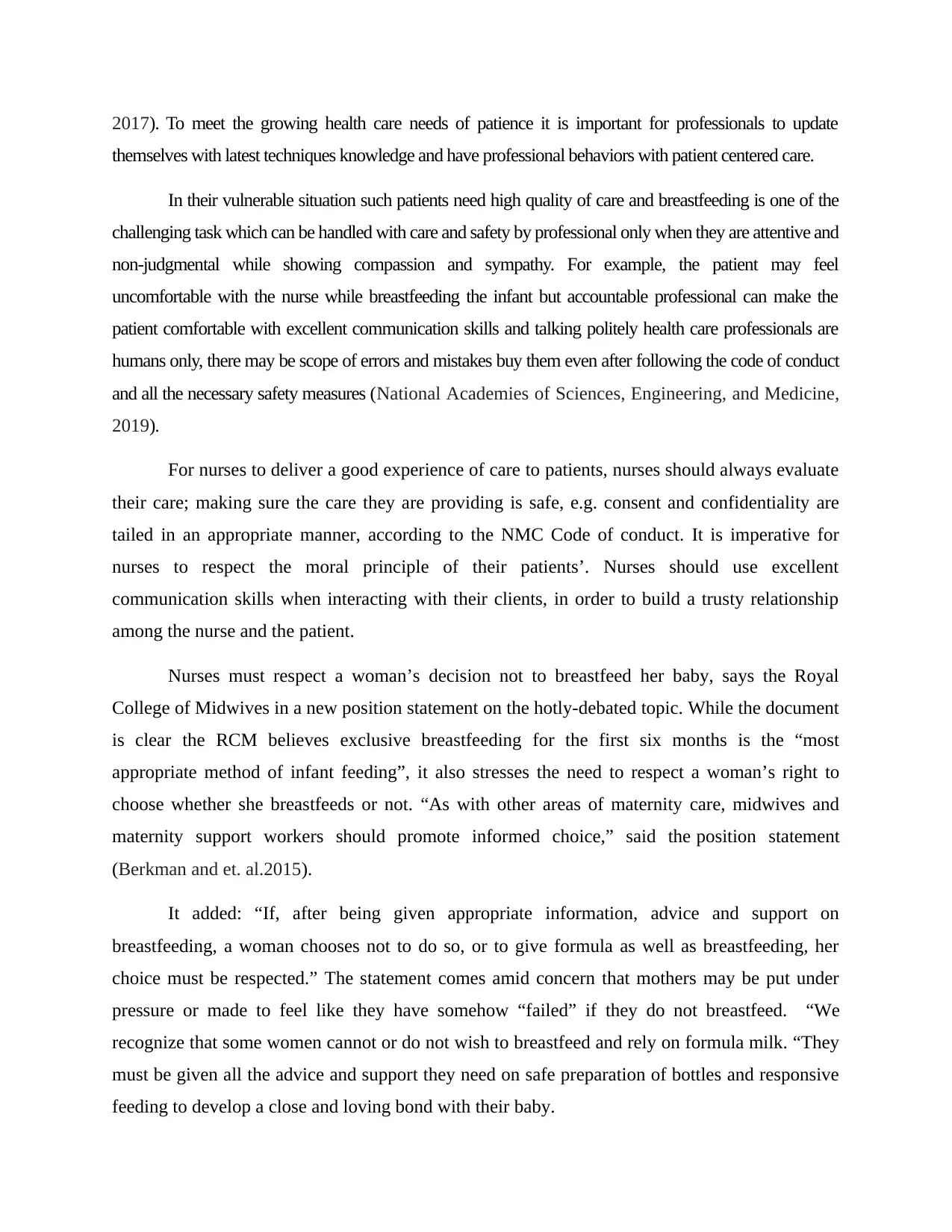
2017). To meet the growing health care needs of patience it is important for professionals to update
themselves with latest techniques knowledge and have professional behaviors with patient centered care.
In their vulnerable situation such patients need high quality of care and breastfeeding is one of the
challenging task which can be handled with care and safety by professional only when they are attentive and
non-judgmental while showing compassion and sympathy. For example, the patient may feel
uncomfortable with the nurse while breastfeeding the infant but accountable professional can make the
patient comfortable with excellent communication skills and talking politely health care professionals are
humans only, there may be scope of errors and mistakes buy them even after following the code of conduct
and all the necessary safety measures (National Academies of Sciences, Engineering, and Medicine,
2019).
For nurses to deliver a good experience of care to patients, nurses should always evaluate
their care; making sure the care they are providing is safe, e.g. consent and confidentiality are
tailed in an appropriate manner, according to the NMC Code of conduct. It is imperative for
nurses to respect the moral principle of their patients’. Nurses should use excellent
communication skills when interacting with their clients, in order to build a trusty relationship
among the nurse and the patient.
Nurses must respect a woman’s decision not to breastfeed her baby, says the Royal
College of Midwives in a new position statement on the hotly-debated topic. While the document
is clear the RCM believes exclusive breastfeeding for the first six months is the “most
appropriate method of infant feeding”, it also stresses the need to respect a woman’s right to
choose whether she breastfeeds or not. “As with other areas of maternity care, midwives and
maternity support workers should promote informed choice,” said the position statement
(Berkman and et. al.2015).
It added: “If, after being given appropriate information, advice and support on
breastfeeding, a woman chooses not to do so, or to give formula as well as breastfeeding, her
choice must be respected.” The statement comes amid concern that mothers may be put under
pressure or made to feel like they have somehow “failed” if they do not breastfeed. “We
recognize that some women cannot or do not wish to breastfeed and rely on formula milk. “They
must be given all the advice and support they need on safe preparation of bottles and responsive
feeding to develop a close and loving bond with their baby.
themselves with latest techniques knowledge and have professional behaviors with patient centered care.
In their vulnerable situation such patients need high quality of care and breastfeeding is one of the
challenging task which can be handled with care and safety by professional only when they are attentive and
non-judgmental while showing compassion and sympathy. For example, the patient may feel
uncomfortable with the nurse while breastfeeding the infant but accountable professional can make the
patient comfortable with excellent communication skills and talking politely health care professionals are
humans only, there may be scope of errors and mistakes buy them even after following the code of conduct
and all the necessary safety measures (National Academies of Sciences, Engineering, and Medicine,
2019).
For nurses to deliver a good experience of care to patients, nurses should always evaluate
their care; making sure the care they are providing is safe, e.g. consent and confidentiality are
tailed in an appropriate manner, according to the NMC Code of conduct. It is imperative for
nurses to respect the moral principle of their patients’. Nurses should use excellent
communication skills when interacting with their clients, in order to build a trusty relationship
among the nurse and the patient.
Nurses must respect a woman’s decision not to breastfeed her baby, says the Royal
College of Midwives in a new position statement on the hotly-debated topic. While the document
is clear the RCM believes exclusive breastfeeding for the first six months is the “most
appropriate method of infant feeding”, it also stresses the need to respect a woman’s right to
choose whether she breastfeeds or not. “As with other areas of maternity care, midwives and
maternity support workers should promote informed choice,” said the position statement
(Berkman and et. al.2015).
It added: “If, after being given appropriate information, advice and support on
breastfeeding, a woman chooses not to do so, or to give formula as well as breastfeeding, her
choice must be respected.” The statement comes amid concern that mothers may be put under
pressure or made to feel like they have somehow “failed” if they do not breastfeed. “We
recognize that some women cannot or do not wish to breastfeed and rely on formula milk. “They
must be given all the advice and support they need on safe preparation of bottles and responsive
feeding to develop a close and loving bond with their baby.
Paraphrase This Document
Need a fresh take? Get an instant paraphrase of this document with our AI Paraphraser
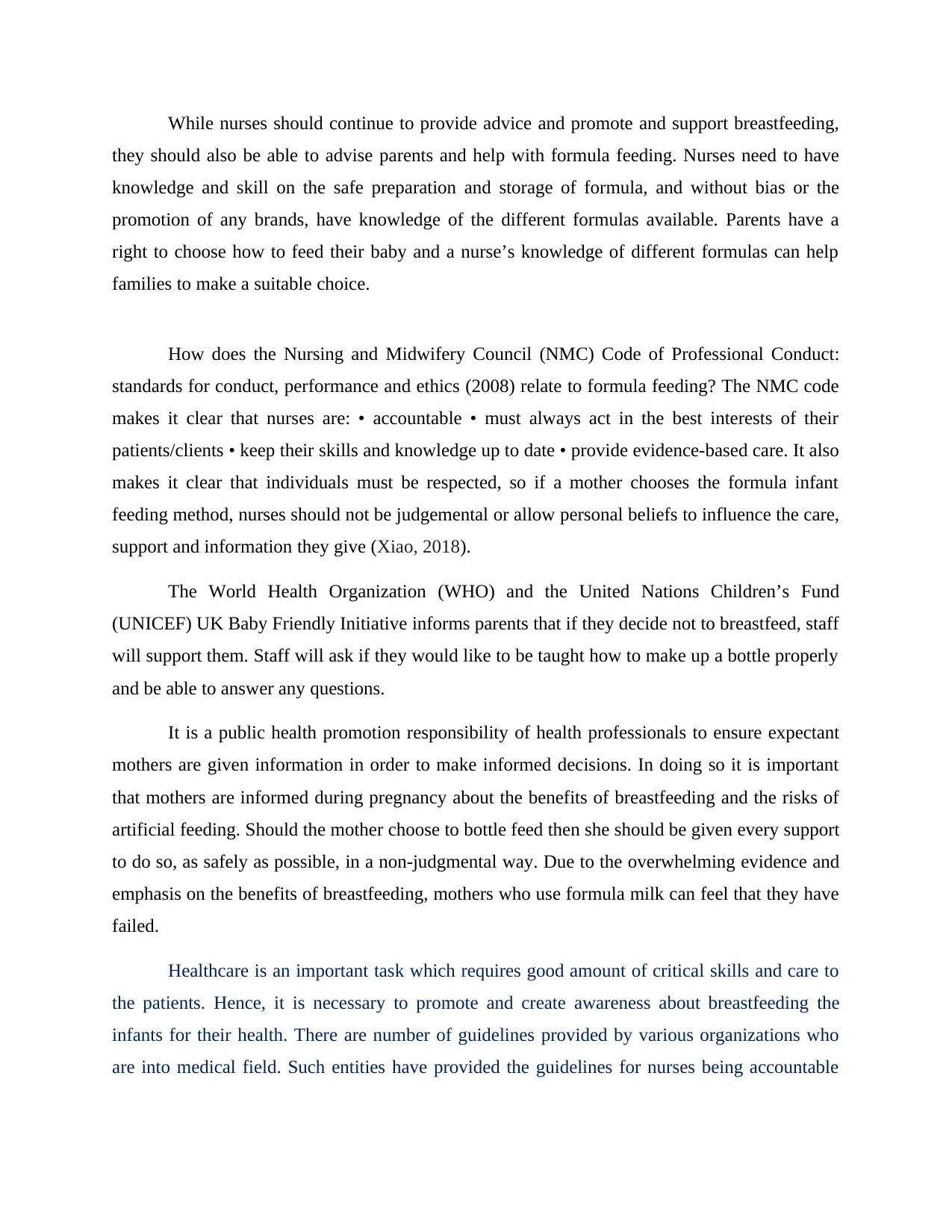
While nurses should continue to provide advice and promote and support breastfeeding,
they should also be able to advise parents and help with formula feeding. Nurses need to have
knowledge and skill on the safe preparation and storage of formula, and without bias or the
promotion of any brands, have knowledge of the different formulas available. Parents have a
right to choose how to feed their baby and a nurse’s knowledge of different formulas can help
families to make a suitable choice.
How does the Nursing and Midwifery Council (NMC) Code of Professional Conduct:
standards for conduct, performance and ethics (2008) relate to formula feeding? The NMC code
makes it clear that nurses are: • accountable • must always act in the best interests of their
patients/clients • keep their skills and knowledge up to date • provide evidence-based care. It also
makes it clear that individuals must be respected, so if a mother chooses the formula infant
feeding method, nurses should not be judgemental or allow personal beliefs to influence the care,
support and information they give (Xiao, 2018).
The World Health Organization (WHO) and the United Nations Children’s Fund
(UNICEF) UK Baby Friendly Initiative informs parents that if they decide not to breastfeed, staff
will support them. Staff will ask if they would like to be taught how to make up a bottle properly
and be able to answer any questions.
It is a public health promotion responsibility of health professionals to ensure expectant
mothers are given information in order to make informed decisions. In doing so it is important
that mothers are informed during pregnancy about the benefits of breastfeeding and the risks of
artificial feeding. Should the mother choose to bottle feed then she should be given every support
to do so, as safely as possible, in a non-judgmental way. Due to the overwhelming evidence and
emphasis on the benefits of breastfeeding, mothers who use formula milk can feel that they have
failed.
Healthcare is an important task which requires good amount of critical skills and care to
the patients. Hence, it is necessary to promote and create awareness about breastfeeding the
infants for their health. There are number of guidelines provided by various organizations who
are into medical field. Such entities have provided the guidelines for nurses being accountable
they should also be able to advise parents and help with formula feeding. Nurses need to have
knowledge and skill on the safe preparation and storage of formula, and without bias or the
promotion of any brands, have knowledge of the different formulas available. Parents have a
right to choose how to feed their baby and a nurse’s knowledge of different formulas can help
families to make a suitable choice.
How does the Nursing and Midwifery Council (NMC) Code of Professional Conduct:
standards for conduct, performance and ethics (2008) relate to formula feeding? The NMC code
makes it clear that nurses are: • accountable • must always act in the best interests of their
patients/clients • keep their skills and knowledge up to date • provide evidence-based care. It also
makes it clear that individuals must be respected, so if a mother chooses the formula infant
feeding method, nurses should not be judgemental or allow personal beliefs to influence the care,
support and information they give (Xiao, 2018).
The World Health Organization (WHO) and the United Nations Children’s Fund
(UNICEF) UK Baby Friendly Initiative informs parents that if they decide not to breastfeed, staff
will support them. Staff will ask if they would like to be taught how to make up a bottle properly
and be able to answer any questions.
It is a public health promotion responsibility of health professionals to ensure expectant
mothers are given information in order to make informed decisions. In doing so it is important
that mothers are informed during pregnancy about the benefits of breastfeeding and the risks of
artificial feeding. Should the mother choose to bottle feed then she should be given every support
to do so, as safely as possible, in a non-judgmental way. Due to the overwhelming evidence and
emphasis on the benefits of breastfeeding, mothers who use formula milk can feel that they have
failed.
Healthcare is an important task which requires good amount of critical skills and care to
the patients. Hence, it is necessary to promote and create awareness about breastfeeding the
infants for their health. There are number of guidelines provided by various organizations who
are into medical field. Such entities have provided the guidelines for nurses being accountable
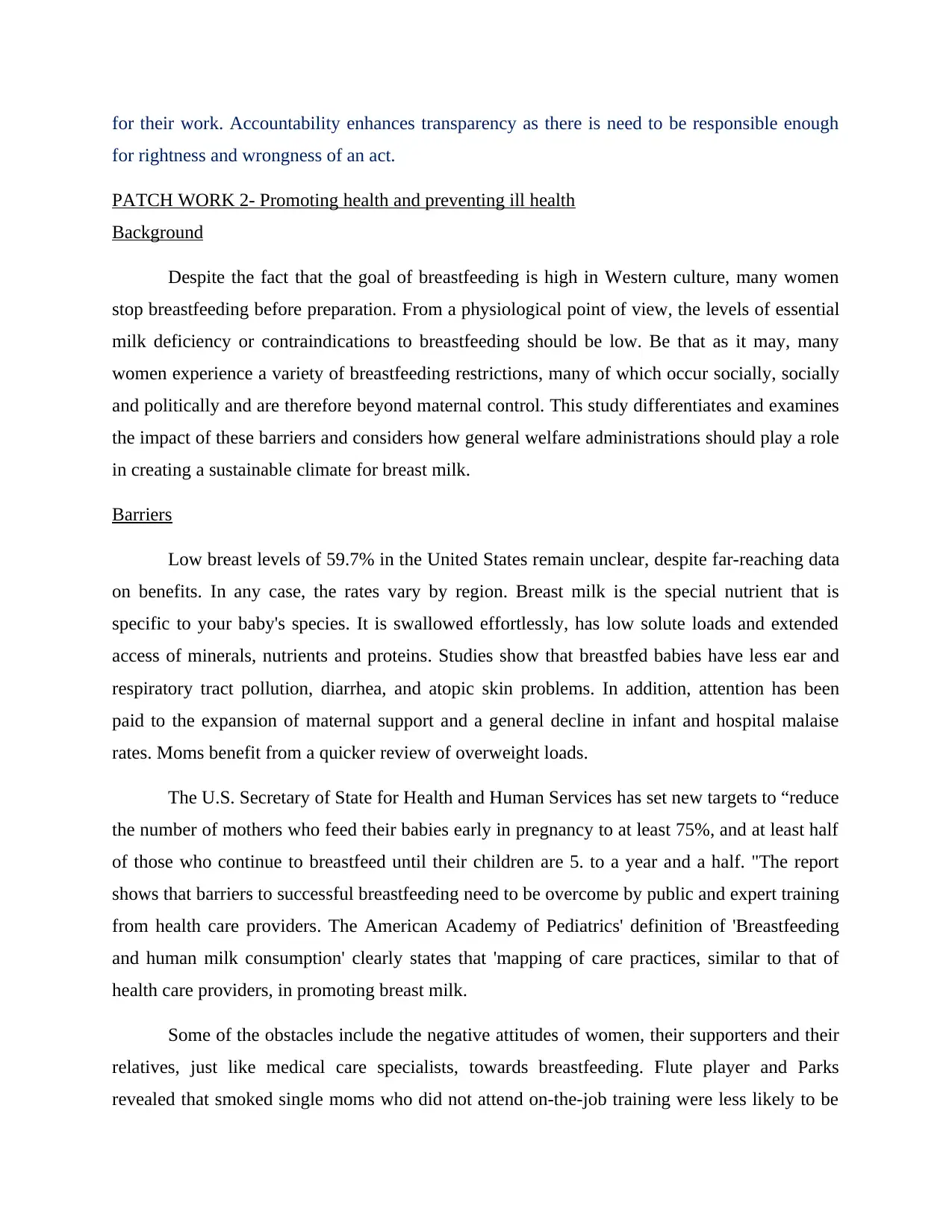
for their work. Accountability enhances transparency as there is need to be responsible enough
for rightness and wrongness of an act.
PATCH WORK 2- Promoting health and preventing ill health
Background
Despite the fact that the goal of breastfeeding is high in Western culture, many women
stop breastfeeding before preparation. From a physiological point of view, the levels of essential
milk deficiency or contraindications to breastfeeding should be low. Be that as it may, many
women experience a variety of breastfeeding restrictions, many of which occur socially, socially
and politically and are therefore beyond maternal control. This study differentiates and examines
the impact of these barriers and considers how general welfare administrations should play a role
in creating a sustainable climate for breast milk.
Barriers
Low breast levels of 59.7% in the United States remain unclear, despite far-reaching data
on benefits. In any case, the rates vary by region. Breast milk is the special nutrient that is
specific to your baby's species. It is swallowed effortlessly, has low solute loads and extended
access of minerals, nutrients and proteins. Studies show that breastfed babies have less ear and
respiratory tract pollution, diarrhea, and atopic skin problems. In addition, attention has been
paid to the expansion of maternal support and a general decline in infant and hospital malaise
rates. Moms benefit from a quicker review of overweight loads.
The U.S. Secretary of State for Health and Human Services has set new targets to “reduce
the number of mothers who feed their babies early in pregnancy to at least 75%, and at least half
of those who continue to breastfeed until their children are 5. to a year and a half. "The report
shows that barriers to successful breastfeeding need to be overcome by public and expert training
from health care providers. The American Academy of Pediatrics' definition of 'Breastfeeding
and human milk consumption' clearly states that 'mapping of care practices, similar to that of
health care providers, in promoting breast milk.
Some of the obstacles include the negative attitudes of women, their supporters and their
relatives, just like medical care specialists, towards breastfeeding. Flute player and Parks
revealed that smoked single moms who did not attend on-the-job training were less likely to be
for rightness and wrongness of an act.
PATCH WORK 2- Promoting health and preventing ill health
Background
Despite the fact that the goal of breastfeeding is high in Western culture, many women
stop breastfeeding before preparation. From a physiological point of view, the levels of essential
milk deficiency or contraindications to breastfeeding should be low. Be that as it may, many
women experience a variety of breastfeeding restrictions, many of which occur socially, socially
and politically and are therefore beyond maternal control. This study differentiates and examines
the impact of these barriers and considers how general welfare administrations should play a role
in creating a sustainable climate for breast milk.
Barriers
Low breast levels of 59.7% in the United States remain unclear, despite far-reaching data
on benefits. In any case, the rates vary by region. Breast milk is the special nutrient that is
specific to your baby's species. It is swallowed effortlessly, has low solute loads and extended
access of minerals, nutrients and proteins. Studies show that breastfed babies have less ear and
respiratory tract pollution, diarrhea, and atopic skin problems. In addition, attention has been
paid to the expansion of maternal support and a general decline in infant and hospital malaise
rates. Moms benefit from a quicker review of overweight loads.
The U.S. Secretary of State for Health and Human Services has set new targets to “reduce
the number of mothers who feed their babies early in pregnancy to at least 75%, and at least half
of those who continue to breastfeed until their children are 5. to a year and a half. "The report
shows that barriers to successful breastfeeding need to be overcome by public and expert training
from health care providers. The American Academy of Pediatrics' definition of 'Breastfeeding
and human milk consumption' clearly states that 'mapping of care practices, similar to that of
health care providers, in promoting breast milk.
Some of the obstacles include the negative attitudes of women, their supporters and their
relatives, just like medical care specialists, towards breastfeeding. Flute player and Parks
revealed that smoked single moms who did not attend on-the-job training were less likely to be
⊘ This is a preview!⊘
Do you want full access?
Subscribe today to unlock all pages.

Trusted by 1+ million students worldwide
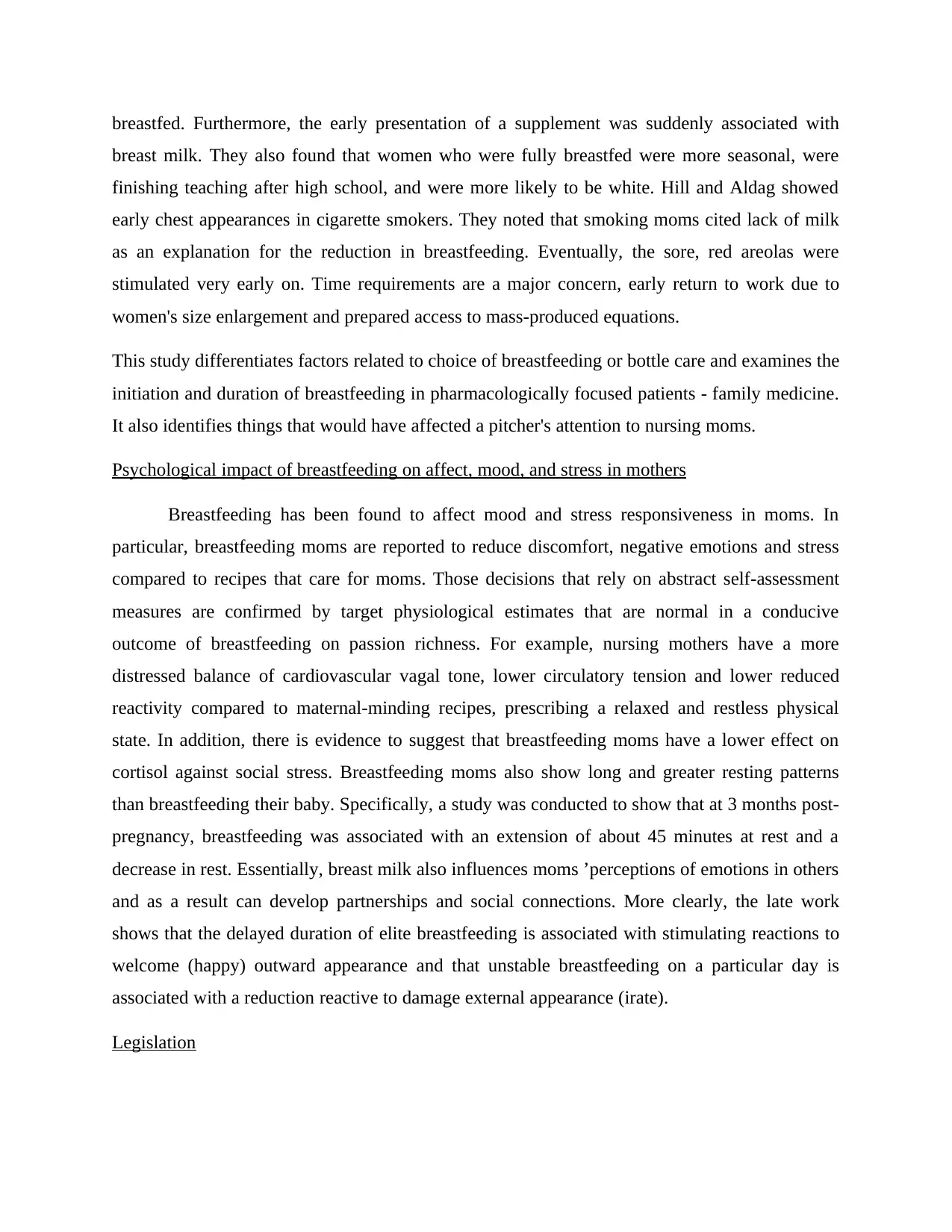
breastfed. Furthermore, the early presentation of a supplement was suddenly associated with
breast milk. They also found that women who were fully breastfed were more seasonal, were
finishing teaching after high school, and were more likely to be white. Hill and Aldag showed
early chest appearances in cigarette smokers. They noted that smoking moms cited lack of milk
as an explanation for the reduction in breastfeeding. Eventually, the sore, red areolas were
stimulated very early on. Time requirements are a major concern, early return to work due to
women's size enlargement and prepared access to mass-produced equations.
This study differentiates factors related to choice of breastfeeding or bottle care and examines the
initiation and duration of breastfeeding in pharmacologically focused patients - family medicine.
It also identifies things that would have affected a pitcher's attention to nursing moms.
Psychological impact of breastfeeding on affect, mood, and stress in mothers
Breastfeeding has been found to affect mood and stress responsiveness in moms. In
particular, breastfeeding moms are reported to reduce discomfort, negative emotions and stress
compared to recipes that care for moms. Those decisions that rely on abstract self-assessment
measures are confirmed by target physiological estimates that are normal in a conducive
outcome of breastfeeding on passion richness. For example, nursing mothers have a more
distressed balance of cardiovascular vagal tone, lower circulatory tension and lower reduced
reactivity compared to maternal-minding recipes, prescribing a relaxed and restless physical
state. In addition, there is evidence to suggest that breastfeeding moms have a lower effect on
cortisol against social stress. Breastfeeding moms also show long and greater resting patterns
than breastfeeding their baby. Specifically, a study was conducted to show that at 3 months post-
pregnancy, breastfeeding was associated with an extension of about 45 minutes at rest and a
decrease in rest. Essentially, breast milk also influences moms ’perceptions of emotions in others
and as a result can develop partnerships and social connections. More clearly, the late work
shows that the delayed duration of elite breastfeeding is associated with stimulating reactions to
welcome (happy) outward appearance and that unstable breastfeeding on a particular day is
associated with a reduction reactive to damage external appearance (irate).
Legislation
breast milk. They also found that women who were fully breastfed were more seasonal, were
finishing teaching after high school, and were more likely to be white. Hill and Aldag showed
early chest appearances in cigarette smokers. They noted that smoking moms cited lack of milk
as an explanation for the reduction in breastfeeding. Eventually, the sore, red areolas were
stimulated very early on. Time requirements are a major concern, early return to work due to
women's size enlargement and prepared access to mass-produced equations.
This study differentiates factors related to choice of breastfeeding or bottle care and examines the
initiation and duration of breastfeeding in pharmacologically focused patients - family medicine.
It also identifies things that would have affected a pitcher's attention to nursing moms.
Psychological impact of breastfeeding on affect, mood, and stress in mothers
Breastfeeding has been found to affect mood and stress responsiveness in moms. In
particular, breastfeeding moms are reported to reduce discomfort, negative emotions and stress
compared to recipes that care for moms. Those decisions that rely on abstract self-assessment
measures are confirmed by target physiological estimates that are normal in a conducive
outcome of breastfeeding on passion richness. For example, nursing mothers have a more
distressed balance of cardiovascular vagal tone, lower circulatory tension and lower reduced
reactivity compared to maternal-minding recipes, prescribing a relaxed and restless physical
state. In addition, there is evidence to suggest that breastfeeding moms have a lower effect on
cortisol against social stress. Breastfeeding moms also show long and greater resting patterns
than breastfeeding their baby. Specifically, a study was conducted to show that at 3 months post-
pregnancy, breastfeeding was associated with an extension of about 45 minutes at rest and a
decrease in rest. Essentially, breast milk also influences moms ’perceptions of emotions in others
and as a result can develop partnerships and social connections. More clearly, the late work
shows that the delayed duration of elite breastfeeding is associated with stimulating reactions to
welcome (happy) outward appearance and that unstable breastfeeding on a particular day is
associated with a reduction reactive to damage external appearance (irate).
Legislation
Paraphrase This Document
Need a fresh take? Get an instant paraphrase of this document with our AI Paraphraser
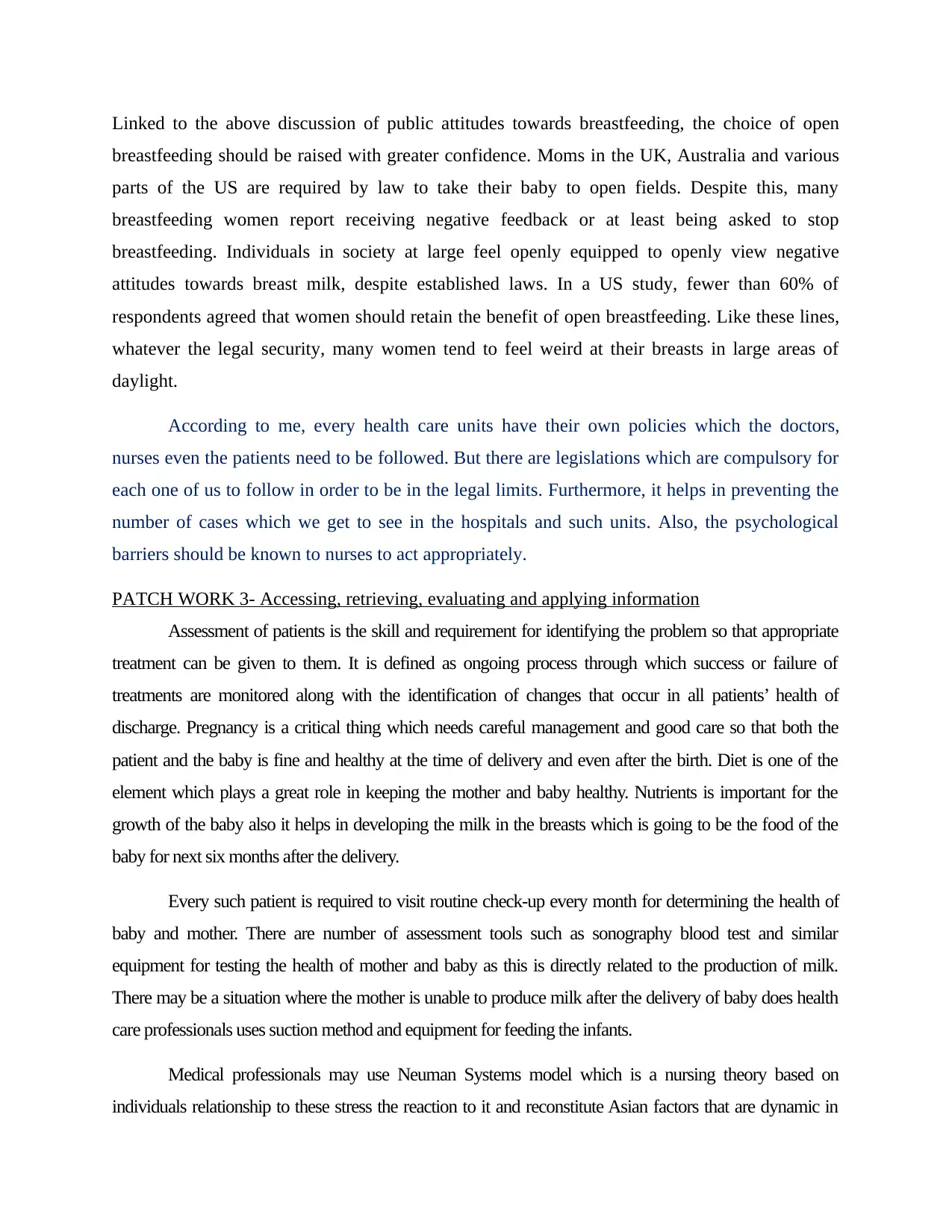
Linked to the above discussion of public attitudes towards breastfeeding, the choice of open
breastfeeding should be raised with greater confidence. Moms in the UK, Australia and various
parts of the US are required by law to take their baby to open fields. Despite this, many
breastfeeding women report receiving negative feedback or at least being asked to stop
breastfeeding. Individuals in society at large feel openly equipped to openly view negative
attitudes towards breast milk, despite established laws. In a US study, fewer than 60% of
respondents agreed that women should retain the benefit of open breastfeeding. Like these lines,
whatever the legal security, many women tend to feel weird at their breasts in large areas of
daylight.
According to me, every health care units have their own policies which the doctors,
nurses even the patients need to be followed. But there are legislations which are compulsory for
each one of us to follow in order to be in the legal limits. Furthermore, it helps in preventing the
number of cases which we get to see in the hospitals and such units. Also, the psychological
barriers should be known to nurses to act appropriately.
PATCH WORK 3- Accessing, retrieving, evaluating and applying information
Assessment of patients is the skill and requirement for identifying the problem so that appropriate
treatment can be given to them. It is defined as ongoing process through which success or failure of
treatments are monitored along with the identification of changes that occur in all patients’ health of
discharge. Pregnancy is a critical thing which needs careful management and good care so that both the
patient and the baby is fine and healthy at the time of delivery and even after the birth. Diet is one of the
element which plays a great role in keeping the mother and baby healthy. Nutrients is important for the
growth of the baby also it helps in developing the milk in the breasts which is going to be the food of the
baby for next six months after the delivery.
Every such patient is required to visit routine check-up every month for determining the health of
baby and mother. There are number of assessment tools such as sonography blood test and similar
equipment for testing the health of mother and baby as this is directly related to the production of milk.
There may be a situation where the mother is unable to produce milk after the delivery of baby does health
care professionals uses suction method and equipment for feeding the infants.
Medical professionals may use Neuman Systems model which is a nursing theory based on
individuals relationship to these stress the reaction to it and reconstitute Asian factors that are dynamic in
breastfeeding should be raised with greater confidence. Moms in the UK, Australia and various
parts of the US are required by law to take their baby to open fields. Despite this, many
breastfeeding women report receiving negative feedback or at least being asked to stop
breastfeeding. Individuals in society at large feel openly equipped to openly view negative
attitudes towards breast milk, despite established laws. In a US study, fewer than 60% of
respondents agreed that women should retain the benefit of open breastfeeding. Like these lines,
whatever the legal security, many women tend to feel weird at their breasts in large areas of
daylight.
According to me, every health care units have their own policies which the doctors,
nurses even the patients need to be followed. But there are legislations which are compulsory for
each one of us to follow in order to be in the legal limits. Furthermore, it helps in preventing the
number of cases which we get to see in the hospitals and such units. Also, the psychological
barriers should be known to nurses to act appropriately.
PATCH WORK 3- Accessing, retrieving, evaluating and applying information
Assessment of patients is the skill and requirement for identifying the problem so that appropriate
treatment can be given to them. It is defined as ongoing process through which success or failure of
treatments are monitored along with the identification of changes that occur in all patients’ health of
discharge. Pregnancy is a critical thing which needs careful management and good care so that both the
patient and the baby is fine and healthy at the time of delivery and even after the birth. Diet is one of the
element which plays a great role in keeping the mother and baby healthy. Nutrients is important for the
growth of the baby also it helps in developing the milk in the breasts which is going to be the food of the
baby for next six months after the delivery.
Every such patient is required to visit routine check-up every month for determining the health of
baby and mother. There are number of assessment tools such as sonography blood test and similar
equipment for testing the health of mother and baby as this is directly related to the production of milk.
There may be a situation where the mother is unable to produce milk after the delivery of baby does health
care professionals uses suction method and equipment for feeding the infants.
Medical professionals may use Neuman Systems model which is a nursing theory based on
individuals relationship to these stress the reaction to it and reconstitute Asian factors that are dynamic in
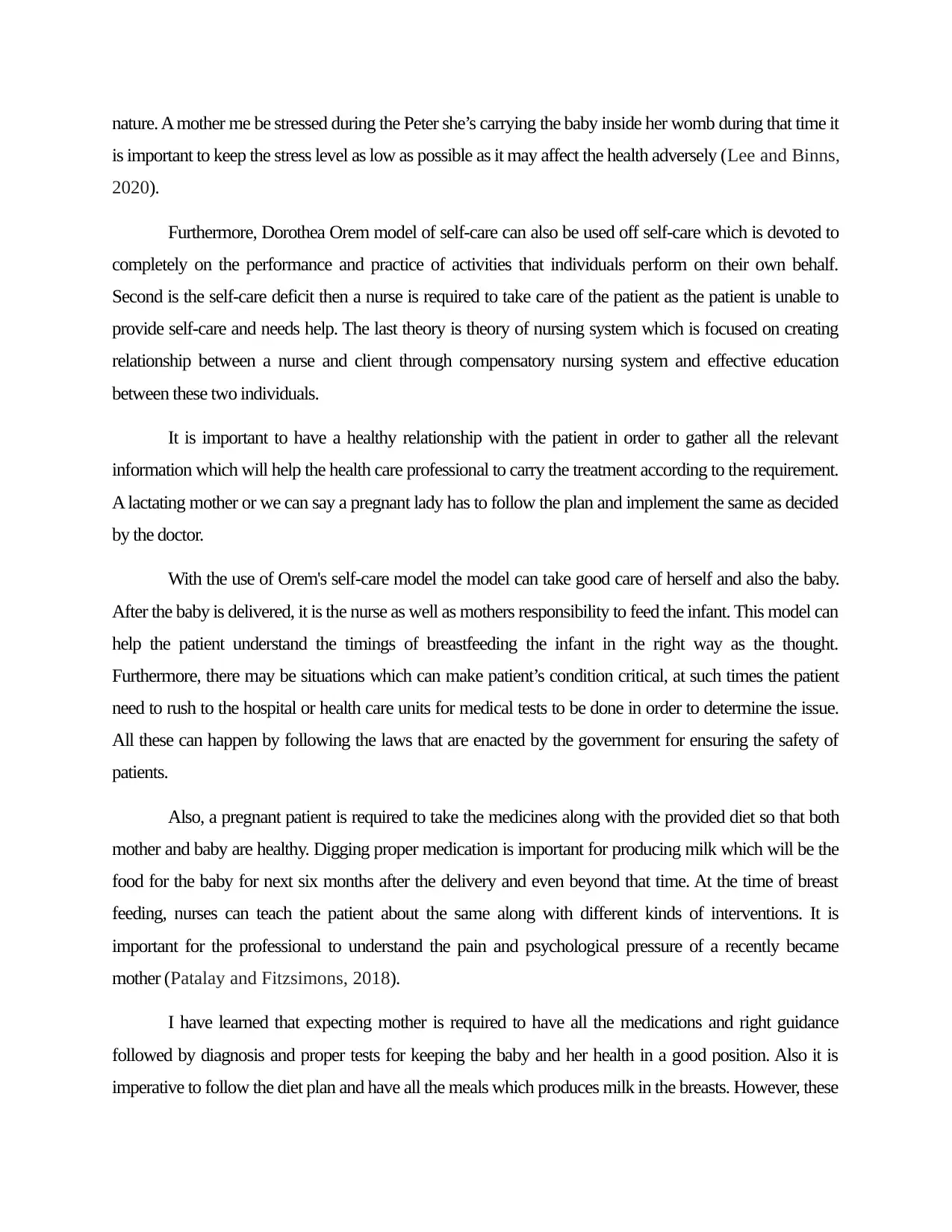
nature. A mother me be stressed during the Peter she’s carrying the baby inside her womb during that time it
is important to keep the stress level as low as possible as it may affect the health adversely (Lee and Binns,
2020).
Furthermore, Dorothea Orem model of self-care can also be used off self-care which is devoted to
completely on the performance and practice of activities that individuals perform on their own behalf.
Second is the self-care deficit then a nurse is required to take care of the patient as the patient is unable to
provide self-care and needs help. The last theory is theory of nursing system which is focused on creating
relationship between a nurse and client through compensatory nursing system and effective education
between these two individuals.
It is important to have a healthy relationship with the patient in order to gather all the relevant
information which will help the health care professional to carry the treatment according to the requirement.
A lactating mother or we can say a pregnant lady has to follow the plan and implement the same as decided
by the doctor.
With the use of Orem's self-care model the model can take good care of herself and also the baby.
After the baby is delivered, it is the nurse as well as mothers responsibility to feed the infant. This model can
help the patient understand the timings of breastfeeding the infant in the right way as the thought.
Furthermore, there may be situations which can make patient’s condition critical, at such times the patient
need to rush to the hospital or health care units for medical tests to be done in order to determine the issue.
All these can happen by following the laws that are enacted by the government for ensuring the safety of
patients.
Also, a pregnant patient is required to take the medicines along with the provided diet so that both
mother and baby are healthy. Digging proper medication is important for producing milk which will be the
food for the baby for next six months after the delivery and even beyond that time. At the time of breast
feeding, nurses can teach the patient about the same along with different kinds of interventions. It is
important for the professional to understand the pain and psychological pressure of a recently became
mother (Patalay and Fitzsimons, 2018).
I have learned that expecting mother is required to have all the medications and right guidance
followed by diagnosis and proper tests for keeping the baby and her health in a good position. Also it is
imperative to follow the diet plan and have all the meals which produces milk in the breasts. However, these
is important to keep the stress level as low as possible as it may affect the health adversely (Lee and Binns,
2020).
Furthermore, Dorothea Orem model of self-care can also be used off self-care which is devoted to
completely on the performance and practice of activities that individuals perform on their own behalf.
Second is the self-care deficit then a nurse is required to take care of the patient as the patient is unable to
provide self-care and needs help. The last theory is theory of nursing system which is focused on creating
relationship between a nurse and client through compensatory nursing system and effective education
between these two individuals.
It is important to have a healthy relationship with the patient in order to gather all the relevant
information which will help the health care professional to carry the treatment according to the requirement.
A lactating mother or we can say a pregnant lady has to follow the plan and implement the same as decided
by the doctor.
With the use of Orem's self-care model the model can take good care of herself and also the baby.
After the baby is delivered, it is the nurse as well as mothers responsibility to feed the infant. This model can
help the patient understand the timings of breastfeeding the infant in the right way as the thought.
Furthermore, there may be situations which can make patient’s condition critical, at such times the patient
need to rush to the hospital or health care units for medical tests to be done in order to determine the issue.
All these can happen by following the laws that are enacted by the government for ensuring the safety of
patients.
Also, a pregnant patient is required to take the medicines along with the provided diet so that both
mother and baby are healthy. Digging proper medication is important for producing milk which will be the
food for the baby for next six months after the delivery and even beyond that time. At the time of breast
feeding, nurses can teach the patient about the same along with different kinds of interventions. It is
important for the professional to understand the pain and psychological pressure of a recently became
mother (Patalay and Fitzsimons, 2018).
I have learned that expecting mother is required to have all the medications and right guidance
followed by diagnosis and proper tests for keeping the baby and her health in a good position. Also it is
imperative to follow the diet plan and have all the meals which produces milk in the breasts. However, these
⊘ This is a preview!⊘
Do you want full access?
Subscribe today to unlock all pages.

Trusted by 1+ million students worldwide
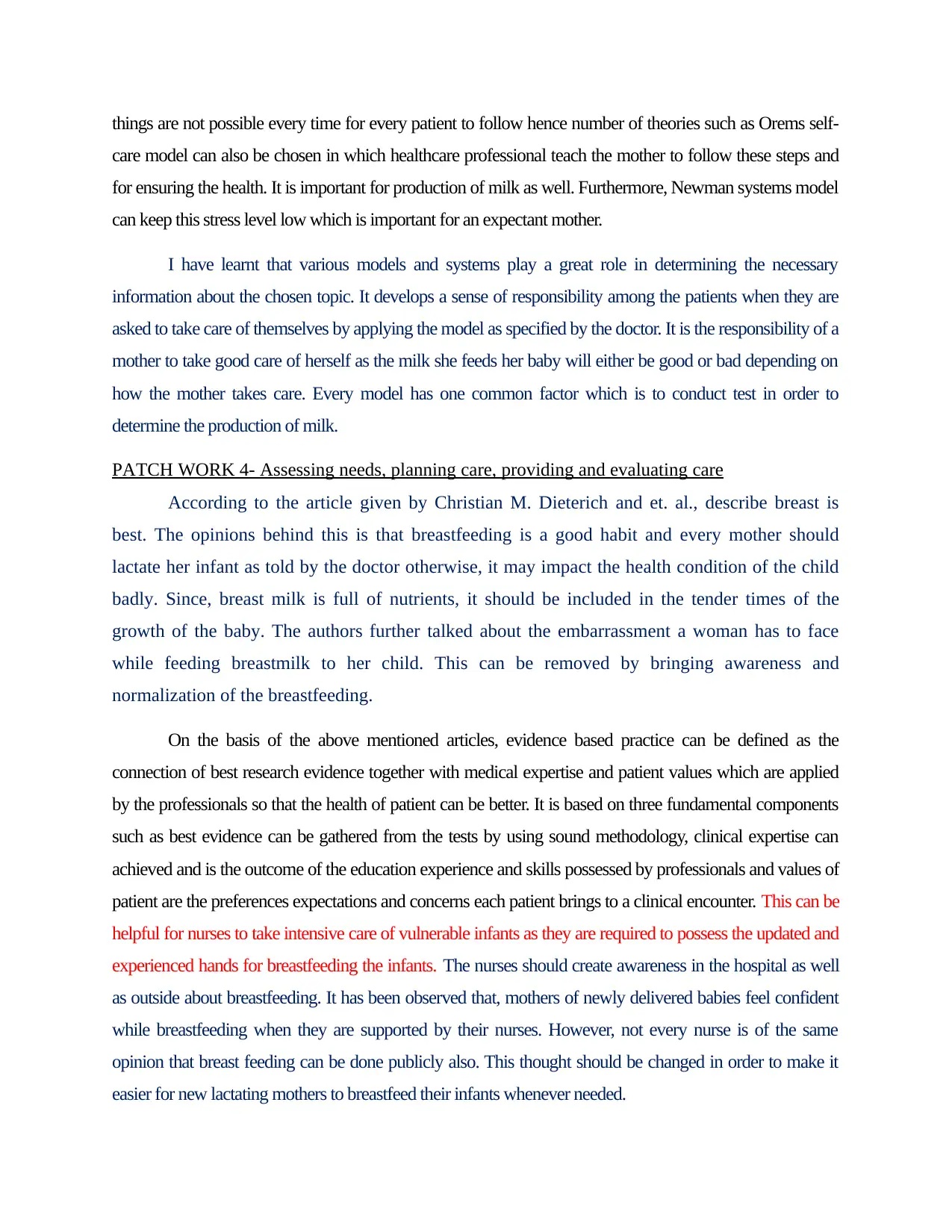
things are not possible every time for every patient to follow hence number of theories such as Orems self-
care model can also be chosen in which healthcare professional teach the mother to follow these steps and
for ensuring the health. It is important for production of milk as well. Furthermore, Newman systems model
can keep this stress level low which is important for an expectant mother.
I have learnt that various models and systems play a great role in determining the necessary
information about the chosen topic. It develops a sense of responsibility among the patients when they are
asked to take care of themselves by applying the model as specified by the doctor. It is the responsibility of a
mother to take good care of herself as the milk she feeds her baby will either be good or bad depending on
how the mother takes care. Every model has one common factor which is to conduct test in order to
determine the production of milk.
PATCH WORK 4- Assessing needs, planning care, providing and evaluating care
According to the article given by Christian M. Dieterich and et. al., describe breast is
best. The opinions behind this is that breastfeeding is a good habit and every mother should
lactate her infant as told by the doctor otherwise, it may impact the health condition of the child
badly. Since, breast milk is full of nutrients, it should be included in the tender times of the
growth of the baby. The authors further talked about the embarrassment a woman has to face
while feeding breastmilk to her child. This can be removed by bringing awareness and
normalization of the breastfeeding.
On the basis of the above mentioned articles, evidence based practice can be defined as the
connection of best research evidence together with medical expertise and patient values which are applied
by the professionals so that the health of patient can be better. It is based on three fundamental components
such as best evidence can be gathered from the tests by using sound methodology, clinical expertise can
achieved and is the outcome of the education experience and skills possessed by professionals and values of
patient are the preferences expectations and concerns each patient brings to a clinical encounter. This can be
helpful for nurses to take intensive care of vulnerable infants as they are required to possess the updated and
experienced hands for breastfeeding the infants. The nurses should create awareness in the hospital as well
as outside about breastfeeding. It has been observed that, mothers of newly delivered babies feel confident
while breastfeeding when they are supported by their nurses. However, not every nurse is of the same
opinion that breast feeding can be done publicly also. This thought should be changed in order to make it
easier for new lactating mothers to breastfeed their infants whenever needed.
care model can also be chosen in which healthcare professional teach the mother to follow these steps and
for ensuring the health. It is important for production of milk as well. Furthermore, Newman systems model
can keep this stress level low which is important for an expectant mother.
I have learnt that various models and systems play a great role in determining the necessary
information about the chosen topic. It develops a sense of responsibility among the patients when they are
asked to take care of themselves by applying the model as specified by the doctor. It is the responsibility of a
mother to take good care of herself as the milk she feeds her baby will either be good or bad depending on
how the mother takes care. Every model has one common factor which is to conduct test in order to
determine the production of milk.
PATCH WORK 4- Assessing needs, planning care, providing and evaluating care
According to the article given by Christian M. Dieterich and et. al., describe breast is
best. The opinions behind this is that breastfeeding is a good habit and every mother should
lactate her infant as told by the doctor otherwise, it may impact the health condition of the child
badly. Since, breast milk is full of nutrients, it should be included in the tender times of the
growth of the baby. The authors further talked about the embarrassment a woman has to face
while feeding breastmilk to her child. This can be removed by bringing awareness and
normalization of the breastfeeding.
On the basis of the above mentioned articles, evidence based practice can be defined as the
connection of best research evidence together with medical expertise and patient values which are applied
by the professionals so that the health of patient can be better. It is based on three fundamental components
such as best evidence can be gathered from the tests by using sound methodology, clinical expertise can
achieved and is the outcome of the education experience and skills possessed by professionals and values of
patient are the preferences expectations and concerns each patient brings to a clinical encounter. This can be
helpful for nurses to take intensive care of vulnerable infants as they are required to possess the updated and
experienced hands for breastfeeding the infants. The nurses should create awareness in the hospital as well
as outside about breastfeeding. It has been observed that, mothers of newly delivered babies feel confident
while breastfeeding when they are supported by their nurses. However, not every nurse is of the same
opinion that breast feeding can be done publicly also. This thought should be changed in order to make it
easier for new lactating mothers to breastfeed their infants whenever needed.
Paraphrase This Document
Need a fresh take? Get an instant paraphrase of this document with our AI Paraphraser
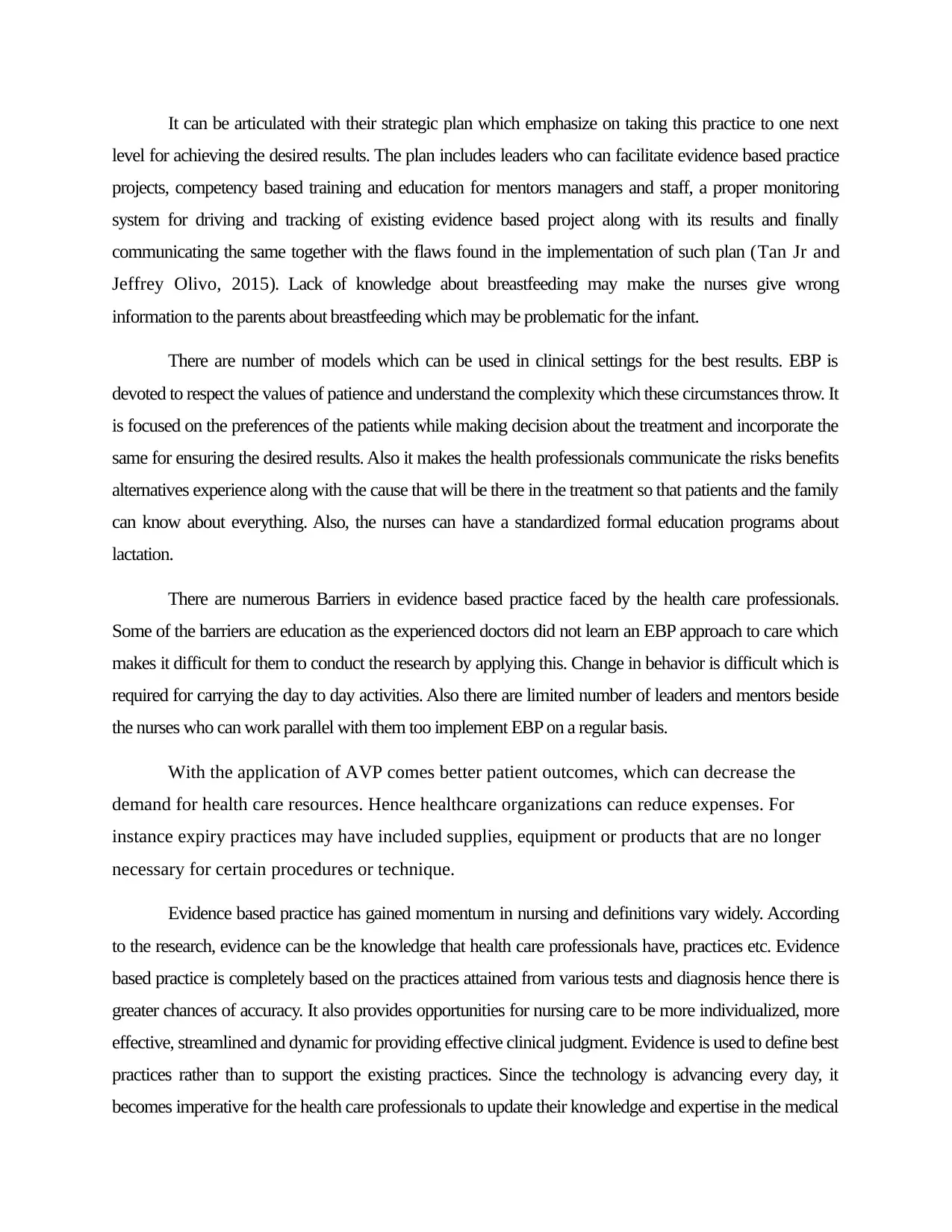
It can be articulated with their strategic plan which emphasize on taking this practice to one next
level for achieving the desired results. The plan includes leaders who can facilitate evidence based practice
projects, competency based training and education for mentors managers and staff, a proper monitoring
system for driving and tracking of existing evidence based project along with its results and finally
communicating the same together with the flaws found in the implementation of such plan (Tan Jr and
Jeffrey Olivo, 2015). Lack of knowledge about breastfeeding may make the nurses give wrong
information to the parents about breastfeeding which may be problematic for the infant.
There are number of models which can be used in clinical settings for the best results. EBP is
devoted to respect the values of patience and understand the complexity which these circumstances throw. It
is focused on the preferences of the patients while making decision about the treatment and incorporate the
same for ensuring the desired results. Also it makes the health professionals communicate the risks benefits
alternatives experience along with the cause that will be there in the treatment so that patients and the family
can know about everything. Also, the nurses can have a standardized formal education programs about
lactation.
There are numerous Barriers in evidence based practice faced by the health care professionals.
Some of the barriers are education as the experienced doctors did not learn an EBP approach to care which
makes it difficult for them to conduct the research by applying this. Change in behavior is difficult which is
required for carrying the day to day activities. Also there are limited number of leaders and mentors beside
the nurses who can work parallel with them too implement EBP on a regular basis.
With the application of AVP comes better patient outcomes, which can decrease the
demand for health care resources. Hence healthcare organizations can reduce expenses. For
instance expiry practices may have included supplies, equipment or products that are no longer
necessary for certain procedures or technique.
Evidence based practice has gained momentum in nursing and definitions vary widely. According
to the research, evidence can be the knowledge that health care professionals have, practices etc. Evidence
based practice is completely based on the practices attained from various tests and diagnosis hence there is
greater chances of accuracy. It also provides opportunities for nursing care to be more individualized, more
effective, streamlined and dynamic for providing effective clinical judgment. Evidence is used to define best
practices rather than to support the existing practices. Since the technology is advancing every day, it
becomes imperative for the health care professionals to update their knowledge and expertise in the medical
level for achieving the desired results. The plan includes leaders who can facilitate evidence based practice
projects, competency based training and education for mentors managers and staff, a proper monitoring
system for driving and tracking of existing evidence based project along with its results and finally
communicating the same together with the flaws found in the implementation of such plan (Tan Jr and
Jeffrey Olivo, 2015). Lack of knowledge about breastfeeding may make the nurses give wrong
information to the parents about breastfeeding which may be problematic for the infant.
There are number of models which can be used in clinical settings for the best results. EBP is
devoted to respect the values of patience and understand the complexity which these circumstances throw. It
is focused on the preferences of the patients while making decision about the treatment and incorporate the
same for ensuring the desired results. Also it makes the health professionals communicate the risks benefits
alternatives experience along with the cause that will be there in the treatment so that patients and the family
can know about everything. Also, the nurses can have a standardized formal education programs about
lactation.
There are numerous Barriers in evidence based practice faced by the health care professionals.
Some of the barriers are education as the experienced doctors did not learn an EBP approach to care which
makes it difficult for them to conduct the research by applying this. Change in behavior is difficult which is
required for carrying the day to day activities. Also there are limited number of leaders and mentors beside
the nurses who can work parallel with them too implement EBP on a regular basis.
With the application of AVP comes better patient outcomes, which can decrease the
demand for health care resources. Hence healthcare organizations can reduce expenses. For
instance expiry practices may have included supplies, equipment or products that are no longer
necessary for certain procedures or technique.
Evidence based practice has gained momentum in nursing and definitions vary widely. According
to the research, evidence can be the knowledge that health care professionals have, practices etc. Evidence
based practice is completely based on the practices attained from various tests and diagnosis hence there is
greater chances of accuracy. It also provides opportunities for nursing care to be more individualized, more
effective, streamlined and dynamic for providing effective clinical judgment. Evidence is used to define best
practices rather than to support the existing practices. Since the technology is advancing every day, it
becomes imperative for the health care professionals to update their knowledge and expertise in the medical
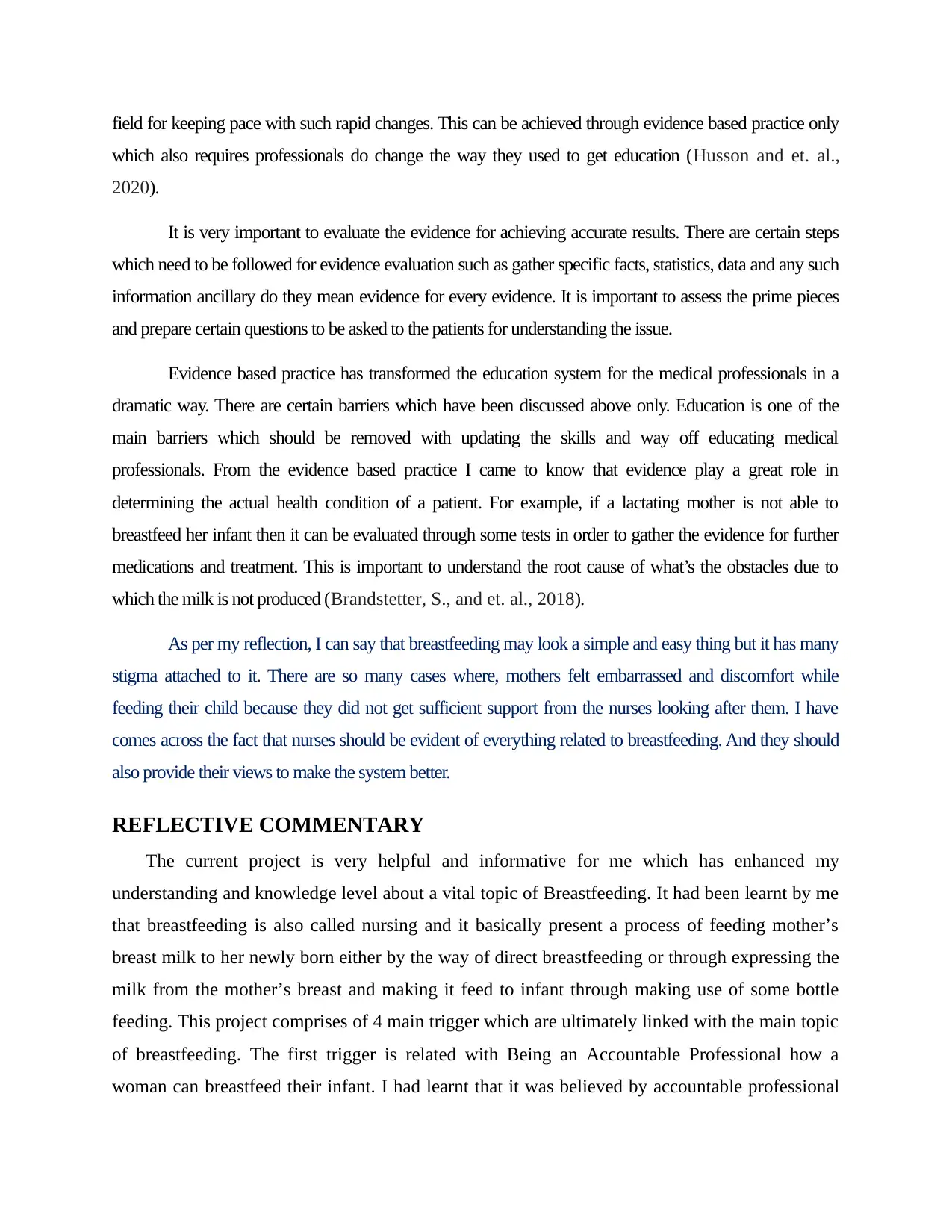
field for keeping pace with such rapid changes. This can be achieved through evidence based practice only
which also requires professionals do change the way they used to get education (Husson and et. al.,
2020).
It is very important to evaluate the evidence for achieving accurate results. There are certain steps
which need to be followed for evidence evaluation such as gather specific facts, statistics, data and any such
information ancillary do they mean evidence for every evidence. It is important to assess the prime pieces
and prepare certain questions to be asked to the patients for understanding the issue.
Evidence based practice has transformed the education system for the medical professionals in a
dramatic way. There are certain barriers which have been discussed above only. Education is one of the
main barriers which should be removed with updating the skills and way off educating medical
professionals. From the evidence based practice I came to know that evidence play a great role in
determining the actual health condition of a patient. For example, if a lactating mother is not able to
breastfeed her infant then it can be evaluated through some tests in order to gather the evidence for further
medications and treatment. This is important to understand the root cause of what’s the obstacles due to
which the milk is not produced (Brandstetter, S., and et. al., 2018).
As per my reflection, I can say that breastfeeding may look a simple and easy thing but it has many
stigma attached to it. There are so many cases where, mothers felt embarrassed and discomfort while
feeding their child because they did not get sufficient support from the nurses looking after them. I have
comes across the fact that nurses should be evident of everything related to breastfeeding. And they should
also provide their views to make the system better.
REFLECTIVE COMMENTARY
The current project is very helpful and informative for me which has enhanced my
understanding and knowledge level about a vital topic of Breastfeeding. It had been learnt by me
that breastfeeding is also called nursing and it basically present a process of feeding mother’s
breast milk to her newly born either by the way of direct breastfeeding or through expressing the
milk from the mother’s breast and making it feed to infant through making use of some bottle
feeding. This project comprises of 4 main trigger which are ultimately linked with the main topic
of breastfeeding. The first trigger is related with Being an Accountable Professional how a
woman can breastfeed their infant. I had learnt that it was believed by accountable professional
which also requires professionals do change the way they used to get education (Husson and et. al.,
2020).
It is very important to evaluate the evidence for achieving accurate results. There are certain steps
which need to be followed for evidence evaluation such as gather specific facts, statistics, data and any such
information ancillary do they mean evidence for every evidence. It is important to assess the prime pieces
and prepare certain questions to be asked to the patients for understanding the issue.
Evidence based practice has transformed the education system for the medical professionals in a
dramatic way. There are certain barriers which have been discussed above only. Education is one of the
main barriers which should be removed with updating the skills and way off educating medical
professionals. From the evidence based practice I came to know that evidence play a great role in
determining the actual health condition of a patient. For example, if a lactating mother is not able to
breastfeed her infant then it can be evaluated through some tests in order to gather the evidence for further
medications and treatment. This is important to understand the root cause of what’s the obstacles due to
which the milk is not produced (Brandstetter, S., and et. al., 2018).
As per my reflection, I can say that breastfeeding may look a simple and easy thing but it has many
stigma attached to it. There are so many cases where, mothers felt embarrassed and discomfort while
feeding their child because they did not get sufficient support from the nurses looking after them. I have
comes across the fact that nurses should be evident of everything related to breastfeeding. And they should
also provide their views to make the system better.
REFLECTIVE COMMENTARY
The current project is very helpful and informative for me which has enhanced my
understanding and knowledge level about a vital topic of Breastfeeding. It had been learnt by me
that breastfeeding is also called nursing and it basically present a process of feeding mother’s
breast milk to her newly born either by the way of direct breastfeeding or through expressing the
milk from the mother’s breast and making it feed to infant through making use of some bottle
feeding. This project comprises of 4 main trigger which are ultimately linked with the main topic
of breastfeeding. The first trigger is related with Being an Accountable Professional how a
woman can breastfeed their infant. I had learnt that it was believed by accountable professional
⊘ This is a preview!⊘
Do you want full access?
Subscribe today to unlock all pages.

Trusted by 1+ million students worldwide
1 out of 16
Related Documents
Your All-in-One AI-Powered Toolkit for Academic Success.
+13062052269
info@desklib.com
Available 24*7 on WhatsApp / Email
![[object Object]](/_next/static/media/star-bottom.7253800d.svg)
Unlock your academic potential
Copyright © 2020–2026 A2Z Services. All Rights Reserved. Developed and managed by ZUCOL.





